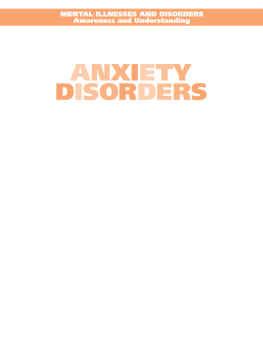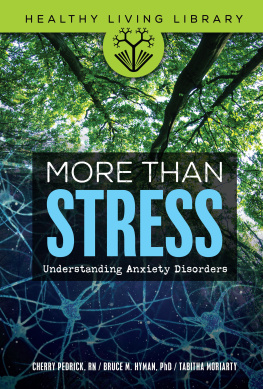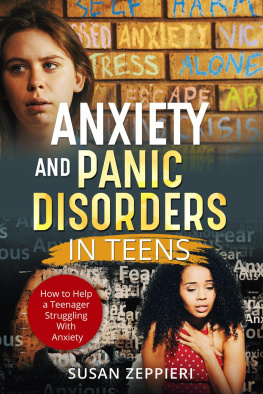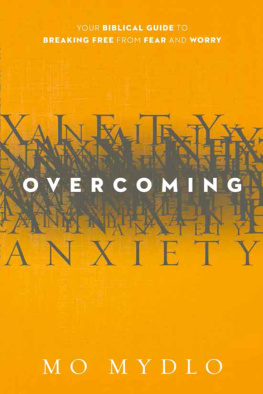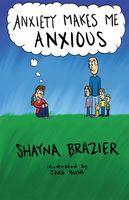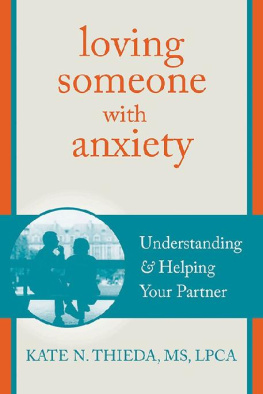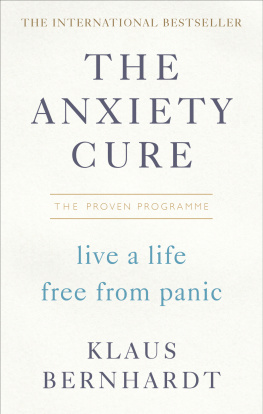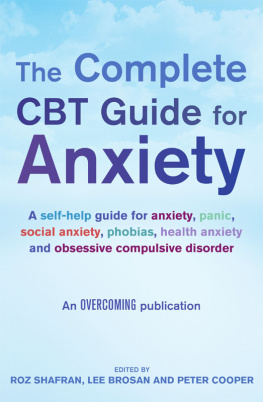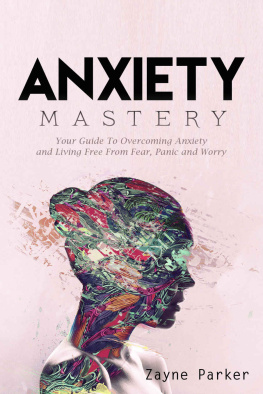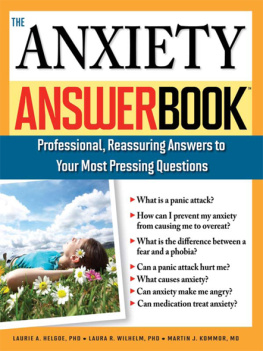Take Control
of
Your Anxiety
A DRUG-FREE APPROACH TO LIVING A HAPPY, HEALTHY LIFE
TAKE CONTROL OF YOUR ANXIETY
DR. CHRIS CORTMAN,
DR. HAROLD SHINITZKY, AND
DR. LAURIE-ANN OCONNOR

Copyright 2015 by Chris Cortman, Harold Shinitzky, and Laurie-Ann OConnor
All rights reserved under the Pan-American and International Copyright Conventions. This book may not be reproduced, in whole or in part, in any form or by any means electronic or mechanical, including photocopying, recording, or by any information storage and retrieval system now known or hereafter invented, without written permission from the publisher, The Career Press.
TAKE CONTROL OF YOUR ANXIETY
EDITED BY GINA SCHENCK
TYPESET BY EILEEN MUNSON
Cover design by Rob Johnson
Printed in the U.S.A.
To order this title, please call toll-free 1-800-CAREER-1 (NJ and Canada: 201-848-0310) to order using VISA or MasterCard, or for further information on books from Career Press.

The Career Press, Inc.
220 West Parkway, Unit 12
Pompton Plains, NJ 07444
www.careerpress.com
Library of Congress Cataloging-in-Publication Data
Cortman, Christopher.
Take control of your anxiety : a drug-free approach to living a happy, healthy life / by Dr. Christopher Cortman, Dr. Harold Shinitzky, and Dr. Laurie-Ann OConnor. -- 1
pages cm
Includes bibliographical references and index.
ISBN 978-1-60163-356-9 (paperback) -- ISBN 978-1-60163-404-7 (ebook) 1. Anxiety. 2. Anxiety disorders. 3. Self-help techniques. I. Shinitzky, Harold. II. OConnor, Laurie-Ann. III. Title.
BF575.A6C667 2015
152.46--dc23
2014045652
Acknowledgments
Christopher
I would like to dedicate this book to my lovely wife Stephanie, who in the midst of a mastectomy and extremely aggressive chemotherapy and radiation, supported me and my efforts to write this book. Never once did she complain about my weekends at Barnes & Noble, nor my meetings with my two coauthors. Only once did she agree with me when I suggested that we sell our three young children on eBay. Stephanie, you are a warrior, a role model, and a very competent human being. Im proud of you for all you have done and are doing. As a result, I dedicate this book to you and every woman grappling with the formidable foe of breast cancer.
I would also like to thank Bruce W. for his many insights and generosity, Lisa the Barnes & Noble unofficial editor, Andrea for her helpful comments and support, and most of all, my patients who have supplied me with more insights and wisdom than any university or college ever could. Thank you for trusting me with your lives and may all of you benefit from our work and this book.
Finally, Id like to thank my children, Cameron, Melina, and Dylan, all of whom sacrificed time with daddy so that I could get this project completed on time. I love you kids more than you will ever understand, until you become parents yourselves.
Harold
I would like to thank my supervisors and colleagues at the Johns Hopkins University School of Medicine for encouraging me to strive to be my best. They emphasized that medication was never the primary intervention. Behavioral interventions were always primary. I would like to thank my family and friends for their support even when I disappeared to write this manuscript. In particular, I would like to thank Teresa for her love, understanding that Sunday nights were with Chris and L.A., and her honesty to intellectually challenge concepts that helped expand key points throughout the book. Lastly, I would like to thank my patients for educating me on their daily personal struggles and experiences with anxiety. By working collaboratively with them toward achieving their goals made my work professionally and personally very rewarding.
Laurie-Ann
Many thanks to Chris and Harold for the opportunity to be a coauthor of this book. It was both an honor and a pleasure to join you in this work. I also thank Dr. Bob Boxley for his advice and years of guidance. Finally, I am grateful for the many people who have shared their stories, lives, and pain with me. You have all taught me more than you know.
We would like to thank Laurie Kelly-Pye, Michael Pye, Adam Schwartz, and all of the great people at Career Press for appreciating the value of addressing the important issue of anxiety.
Contents
Introduction
There must be 17,632 books on anxiety. So why another one? Time magazine recently declared that anxiety has two faces: it can paralyze youor help you move faster. New science is revealing more about the upside of angst. But to the rest of us, when the race is to make it to dinnertime without losing our tempers, jobs, or minds over the stress-ors we juggle, anxiety is no friend.
Anxiety disorders are the new common cold of mental illness, replacing depression as the most oft-diagnosed emotional disorder. The world is faster paced, more complicated, more diverse, and more competitive than ever. Its virtually impossible to traverse your 80 or more years of life without experiencing an overload of anxiety symptoms at some point, which brings me to the next point: this book is not only for the 18.1 percent of Americans suffering from an anxiety disorder. Its also for the other 81.9 percent of Americans who are experiencing sub-clinical (normal) symptoms of anxiety, like you.
What I have attempted to create is a book that is entirely readable and informativeedutainment, if you willto help you understand and take control of your anxiety. (Note the clever inclusion of the book title.) I aim to help you become a more knowledgeable, healthy, and high-functioning individual after reading this book by applying the principles, doing the exercises, and practicing new thinking styles and techniques. Change requires effort and you may need to make some changes.
The stories and examples are real and are included to serve as helpful illustrations as to how the principles, techniques, and tools work. Some of these may be more helpful to you than others. Your results may vary, however, I want you to know that there is hope, even for hopelessly anxious you.
I will stay in the first person throughout the book despite the contributions of three authors. (If you like the writing style, credit Dr. Cortman. If not, blame Drs. Shinitzky and OConnor.)
Another thing: we do not talk much about medication in the book. Why not? As psychologists, we owe you the understanding and knowledge of 100-ish years of psychological science that can help you to take control of your anxiety (there it is again). Finally, we are pleased to inform you that the research has repeatedly confirmed that the very best treatments for all anxiety disorders are psychologic, not psychotropic (medication).
Dont get me wrong. I am not anti-medication and definitely not anti-psychiatrist. But let me make this point: if you are taking medication for anxiety without any other type of help, you are not doing everything you can for your issues. So thank you for buying my book. Now go buy one for your physician.
Understanding Anxiety
If stress burns calories, Id be a super model.
Unknown
Scotts Story
Scott was anxious
Next page

